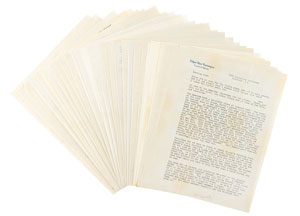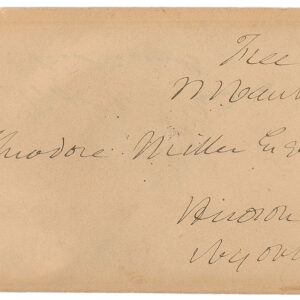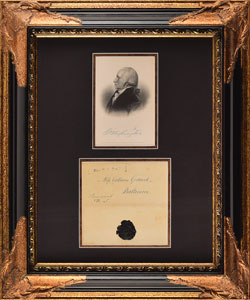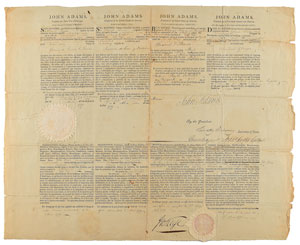Description
Noteworthy collection of 33 TLSs from Edgar Rice Burroughs, most signed in pencil as “Papa,”
48 total pages, each approximately 8.5 x 11, personal letterhead
dated between December 1940 and October 1945
The letters are addressed to his children, with the majority directed to his daughter Joan, and written during World War II while Burroughs served as a war correspondent in Hawaii and onboard ships in the South Pacific. Highlights of the archive are as follows:
December 23, 1940: “I haven’t written a ‘dear children’ letter since Oct 27; how time does fly! My only excuse is that I have been doing other writing, having written more than 330,000 words since I came in to this office in September.”
March 6, 1941: “Glad you liked the John Carter story: there is one audience of which I am always certain.”
June 13, 1941: “I did not like the picture you drew of me—it looked too much like me. I prefer to look like some one else, almost any one else. I think your old Tarzan dog was beautiful; so was Brigadier Rex, and some of our cows and pigs were lovely; but I can never hope to obtain such pulchritude.”
April 17, 1941: “Nothing thrilling to report. Every morning I hear, faintly, the sound of reveille from nearby Fort Ruger at 6:15, whereupon I thumb my nose and turn over for two more hours of sleep. Later in the morning, I hear big guns and little guns booming in the distance and the roar of the motors of fighters and bombers overhead; then I turn over on the other side and contemplate the horrors of war.”
September 15, 1941: “I have read Berlin Diary, and Hulbert is now reading it. We both enjoyed it immensely. I read a condensation of ‘What Makes Sammy Run.’ I liked that, too. About the only other comparatively recent book I have read is For Whom the Bell Tolls, which I thought was most entertaining, especially as I read it with a Spanish-English dictionary by my side and did not miss any of the obscenity.”
December 18, 1941, some 11 days after the attack on Pearl Harbor: “Your very welcome letter of the 12th arrived yesterday, indicating that Clipper service has been resumed at least partially. It is a relief to know this, as we felt very much cut off from the world for a while…The war now seems very far from us, notwithstanding the recent presence of Japanese submarines in these waters…and there is no fear nor hysteria here. There was very little of either apparent even during the air-raids. The Islanders are splendid—just as all Americans will be when put to the test.”
April 15, 1942: “We have many shortages here. Seemingly miles of counters in Kress’s are empty. No more lighter fluid. Sears, Roebuck has no pins today. Many brands of cigarettes are exhausted. We often go without butter for days. There is a shortage of fresh fruits and vegetables. However, we still get plenty to eat; and my weight remains at 168 despite my hopes of getting it lower. But a drop of 32 lbs isn’t bad at that. That was a doggone heavy load to carry around.”
June 12, 1942: “A few outstanding thrills come to each of us during a lifetime. An hour ago I experienced one of my greatest. It was when I ran into Hulbert on the Niumalu Hotel grounds and saw that he was wearing an officer’s overseas cap and the gold bars of a 2nd Lieutenant. I damn near cried…Hulbert says that every one at the post is terrifically elated over the Midway victory.”
January 20, 1943: “Yep, I hide my head in shame. I am an autograph hound. I have filled two books and am about to start on the third. I’ve got privates, Pfcs, corporals, sergeants, lieutenants, captains, majors, colonels, generals, nurses (pretty ones), an American Consul, two governors, Australians, New Zealanders, Englishmen, Frenchmen, and I hope to get a cannibal. Practically all of them mean something to me. I don’t ask for any that don’t. As a War Correspondent, my dear, your Dad is a flop; but he’s having one hell of a good time.”
February 21, 1945: “It seems that [Hulbert] and I have accumulated a number of books since we have been here. Being Burroughses, we hate to part with books. Also, being Burroughses, we dread the thought of packing them all up.”
September 23, 1945: “As I wrote Ralph today, I had a heart attack recently which will probably keep me in bed for some time. I am improving rapidly and in do danger.” In overall fine condition. Despite his age of 65, Burroughs applied for and received permission to become a war correspondent, thus becoming one of the oldest U.S. war correspondents during World War II. When the war ended, Burroughs moved back to Encino, California, where after many health problems, he died of a heart attack on March 19, 1950, having written almost 80 novels. A magnificent archive loaded with great personal insight from one of fiction’s most influential writers.




